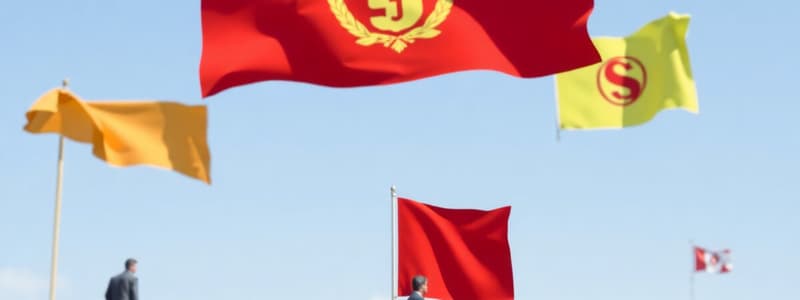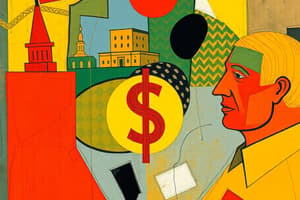Podcast
Questions and Answers
In a capitalist system, what is the typical role of the government?
In a capitalist system, what is the typical role of the government?
- To have a limited role. (correct)
- To directly manage the distribution of goods and services.
- To control all aspects of the economy.
- To own the means of production.
What concept supports the idea of a limited government role in a capitalist system?
What concept supports the idea of a limited government role in a capitalist system?
- The dictatorship of the proletariat.
- Central planning.
- The Communist Manifesto.
- The invisible hand. (correct)
Why was 19th-century capitalism considered an unfair system by some?
Why was 19th-century capitalism considered an unfair system by some?
- Because of the extreme wealth disparity it created. (correct)
- Because it eliminated class struggle.
- Due to the lack of technological advancements.
- Because it focused on collective ownership.
In a socialist system, what role does the government typically play in the economy?
In a socialist system, what role does the government typically play in the economy?
According to Marx, what would ultimately happen in a socialist society?
According to Marx, what would ultimately happen in a socialist society?
In a communist system, what is the role of the government regarding the economy?
In a communist system, what is the role of the government regarding the economy?
What is the primary goal of a communist society according to the traditional theory?
What is the primary goal of a communist society according to the traditional theory?
Which of the following best describes the political system in Russia described in the text?
Which of the following best describes the political system in Russia described in the text?
What was a major contributing factor to the strain on the Russian government leading up to the Russian Revolution?
What was a major contributing factor to the strain on the Russian government leading up to the Russian Revolution?
What was Lenin's view regarding the Russian working class before the Revolution?
What was Lenin's view regarding the Russian working class before the Revolution?
What was the primary purpose of the Cheka during the Bolshevik revolution?
What was the primary purpose of the Cheka during the Bolshevik revolution?
What kind of economic practices did Lenin incorporate into the New Economic Policy?
What kind of economic practices did Lenin incorporate into the New Economic Policy?
What would have most likely happened if World War I had not taken place?
What would have most likely happened if World War I had not taken place?
Which of the following was NOT a major problem faced by Russian troops on the Eastern Front of World War I?
Which of the following was NOT a major problem faced by Russian troops on the Eastern Front of World War I?
What action by the Russian government prior to 1917 created a major source of social unrest?
What action by the Russian government prior to 1917 created a major source of social unrest?
What was a significant aspect of the February Revolution of 1917, as stated in the content?
What was a significant aspect of the February Revolution of 1917, as stated in the content?
Flashcards
Capitalism
Capitalism
A system where private individuals own and control the means of production, competing freely in the market.
The Invisible Hand
The Invisible Hand
The idea that individuals pursuing their own self-interest in a free market unintentionally benefit society as a whole.
Economic Inequality
Economic Inequality
The uneven distribution of wealth and resources among different groups in society. Common in capitalist systems.
Socialism
Socialism
Signup and view all the flashcards
Classless Society in Socialism
Classless Society in Socialism
Signup and view all the flashcards
Communism
Communism
Signup and view all the flashcards
Classless Society in Communism
Classless Society in Communism
Signup and view all the flashcards
Single-Party State
Single-Party State
Signup and view all the flashcards
What was the February Revolution?
What was the February Revolution?
Signup and view all the flashcards
What was Lenin's perspective on the Russian Revolution?
What was Lenin's perspective on the Russian Revolution?
Signup and view all the flashcards
How did the Bolsheviks maintain control?
How did the Bolsheviks maintain control?
Signup and view all the flashcards
What was Lenin's New Economic Policy?
What was Lenin's New Economic Policy?
Signup and view all the flashcards
Was World War I the only cause of the Russian Revolution?
Was World War I the only cause of the Russian Revolution?
Signup and view all the flashcards
What was a major problem faced by Russian troops in World War I?
What was a major problem faced by Russian troops in World War I?
Signup and view all the flashcards
What were the main factors that led to the Russian Revolution?
What were the main factors that led to the Russian Revolution?
Signup and view all the flashcards
What was the Russian Revolution about?
What was the Russian Revolution about?
Signup and view all the flashcards
Study Notes
Capitalism
- Private ownership of industry is a core principle.
- Freedom of competition is a hallmark.
- Unequal economic classes result.
- Government role is limited, supporting the "invisible hand" concept, which suggests the market regulates itself through competition.
- Capitalism was viewed as unfair in the 19th century due to extreme wealth disparities.
- Government control of the economy is a defining feature of socialism.
Socialism
- Government controls almost all aspects of the economy.
- Marx predicted a classless society, with the means of production collectively owned by the people.
Communism
- Government completely controls the entire economy, managing the distribution of goods and services directly.
- The goal is a classless society.
Russian Revolution
- Tsar Nicholas II's actions eroded public trust and created a power vacuum, leading to the revolution.
- World War I strained the Russian economy, causing hardship and military losses.
- Lenin adapted Marxist ideas to fit Russian society, arguing for the necessity of a proletarian revolution.
- Lenin and Trotsky used brutality and terror, including the Cheka, to win the civil war.
- Lenin incorporated capitalist measures into the New Economic Policy, allowing for private ownership of small businesses and some agricultural production, while retaining state control over large industries.
Studying That Suits You
Use AI to generate personalized quizzes and flashcards to suit your learning preferences.




